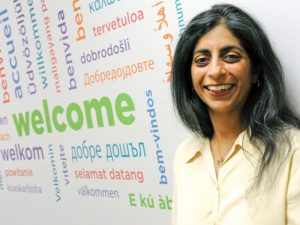 When Meharoona Ghani was eight years old, living in small town BC, she was surrounded by Caucasian kids and taunted with racial slurs. This memory was brought forth again as she rode the 240 bus to Vancouver and passed the Trump tower during the US Presidential election. Seeing this sign, she could ‘feel’ that something had changed; she became afraid. Her fear spurned her into action.
When Meharoona Ghani was eight years old, living in small town BC, she was surrounded by Caucasian kids and taunted with racial slurs. This memory was brought forth again as she rode the 240 bus to Vancouver and passed the Trump tower during the US Presidential election. Seeing this sign, she could ‘feel’ that something had changed; she became afraid. Her fear spurned her into action.
“If I’m afraid,” she thought to herself, “how do others feel? What steps can I take? What’s in my control?”
Ghani started by forming talking circles amongst her colleagues, providing a safe space for people to share what was in their heart. Here, she found: a self-identified Chinese individual worried about her Iranian friends and clients – “this can happen to me next. We can be rounded up again;” seniors articulating that it feels like Nazi Germany again; Muslim women with hijabs, and without, pointing fingers – “it’s because of you people that this is happening.” The bottom line, explained Ghani, is fear; regardless of skin colour or identity.
As she was participating in these discussions, a white supremacist, accused of shooting up a Quebec City mosque, killed six and wounded 19. Swastikas and racial slurs were spray-painted around the North Shore. Racism was becoming bold.
Ghani became convinced that a larger conversation needed to take place. With support of NSIIP, she organized the ‘Acting Against Racism: Strategies for Moving Forward’ forum, held Thursday, September 14th at West Vancouver’s Kay Meek Centre. This event brought together five speakers from diverse backgrounds to address the current issues of racist, anti-immigrant and Islamophobic views. A whopping 480 people responded to this sold-out event.
Sunera Thobani, Associate Professor in the Department of Asian Studies and the Institute for Gender, Race, Sexuality and Social Justice at the University of British Columbia stated that racism works through dividing and conquering communities. Sobering statistics from Statistics Canada have shown an increase in hate crimes against Muslims by 60% with a majority of these directed towards women. Racism, she states, is embedded in institutional structure of our society. Our media, connected to larger political practices, plays a leading role in normalizing racial stereotypes, attitudes, and constructs of who Muslims are and what they do.
Josh Patterson, has seen a rise in this emboldenment of racist views in his role as Executive Director of the British Columbia Civil Liberties Association (BCCLA). He notes that white people are often surprised by these overt acts of racism but, he argues, this is because they don’t go through their days battling racism, subtle or not. Marcus Wong agrees. A fifth-generation Canadian, who fluently speaks both official languages, and sits on the boards of directors of the West Vancouver Police Department, the BC Association of Police Boards, the North Shore Multicultural Society, and the West Vancouver Track & Field Club, finds his ‘belonging’ in Canada continually questioned.
In order to fight racism, we first need to identify it. Handel Kashope Wright, Professor and Director of the Centre for Culture, Identity & Education, University of British Columbia, says that we tell ourselves, and the world, that Canada is a joyous, harmonious, multicultural society, however, it may not reflect the lived realities for people of colour.
Once identified, we need to respond appropriately. Shelina Neallani is a member of the Family, Civil and Child Protection Rosters with Mediate BC, is an accredited Family Law Mediator and Arbitrator with the Law Society of BC and a registered Social Worker with the BC College of Social Workers. She approaches racism from a conflict resolution approach. She finds that people who practice or rehearse what to say in the event that racism is encountered turn from reactor to responder. She offered direct responses to racism: “I find that comment disrespectful and it made me uncomfortable,” and indirect responses: “You’re not really telling a racist joke, are you?” The key, in all situations, is to feel safe enough to express yourself. If you find that you’re doing nothing, you need to ask yourself ‘why.’
We need to model reconciliation in our families first. Charlene Seward, a member of the Squamish Nation, and Community Engagement Manager for Reconciliation Canada, says that children only know what we teach them. If we’re teaching them hate and discrimination, they are going to pass this on to other children in our schools. “We are all one,” she says, “we share a common humanity.” This sentiment was echoed many times through the forum. We cannot do this work alone. We need to form coalitions, and alliances – working together to reduce racism’s power. Apathy is something we cannot afford. Think. Act. Be political.

